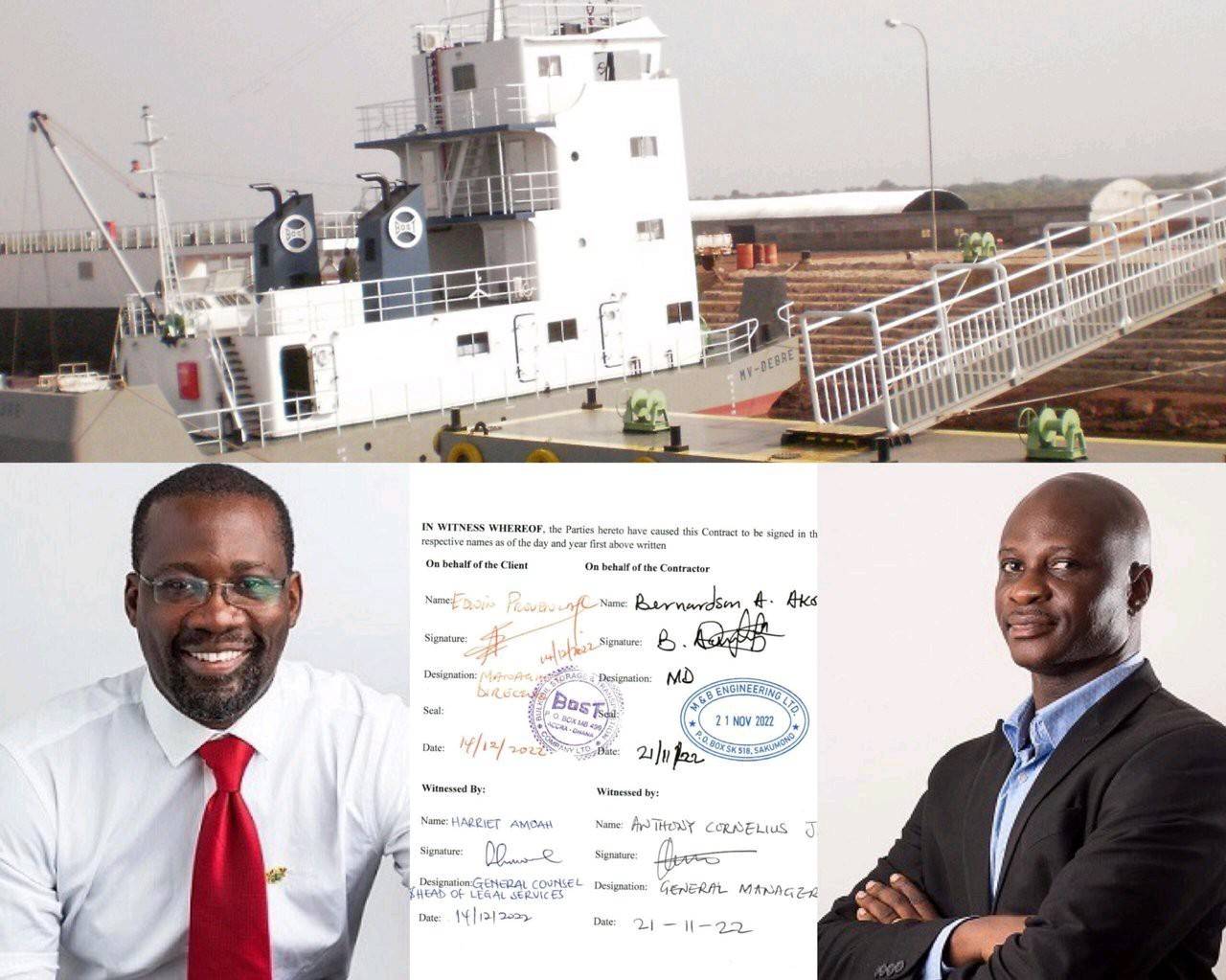A scandal is brewing at the Bulk Oil Storage and Transportation Company (BOST) involving a multimillion-cedi project to rehabilitate a tugboat at the company’s Akosombo facility. This project, which began in October 2022, was supposed to last just five months. Instead, it has dragged on for nearly two years, burning through nearly six million cedis with little to show for it. Ghanaians are now demanding answers as questions about corruption and mismanagement come to light.
The contract for this project, worth over GHS 5.6 million, was awarded to M&B Limited in 2022. In a letter signed by BOST’s Managing Director Edwin Provencal, the company expressed its satisfaction in awarding the contract for repairs on the tugboat, modifications to discharge pipelines, and the installation of pumps. The contractor was required to provide a performance bond of GHS 565,345.56, which is 10% of the contract value, and complete the project in four days after receiving the letter.
But almost two years later, the tugboat is still not operational. According to eyewitnesses, very little work has been done. The vessel has undergone some oil changes, received a fresh coat of paint, and been fitted with non-functional navigational equipment. Beyond these superficial efforts, no meaningful progress has been made to get the tugboat back in action.
Despite the hefty sums spent, the tugboat remains unfit for use. Insiders reveal that BOST’s management, led by one Josiah, has been pressuring workers to get the tugboat to move even once. They believe that if the boat is able to sail a single voyage, they can use it as evidence to defend their spending against investigations by the incoming NDC administration. This desperate move, critics argue, is nothing more than an attempt to cover up inefficiencies and avoid being held accountable for financial mismanagement.
Even more alarming are allegations that the contractor responsible for the project may not even exist. Employees at the Akosombo site claim they have never seen or interacted with the contractor. Some suspect that the project is being handled internally by BOST staff under questionable circumstances. If true, this would be a serious breach of transparency and accountability in the procurement process.
Further complicating the situation is the alleged involvement of a top general manager at BOST. This individual is said to have personally supplied some of the equipment used for the oil changes and other modifications on the tugboat. This raises even more questions about whether proper procurement processes were followed and whether personal interests were prioritized over the company’s responsibilities.
Sources close to the project claim that some managers at BOST are trying to bribe Volta Lake Transport Company (VLTC) staff to assign crew members to the tugboat. This would create the illusion that the boat is ready for operation, even though it isn’t. Such actions, if true, suggest a desperate attempt to mislead the public and avoid accountability.
The contract’s timeline and budget overruns, along with the lack of transparency, have sparked outrage among Ghanaians. Many are questioning how millions of taxpayer cedis could be spent on a project with no tangible results. Critics argue that this is yet another example of wasteful spending and poor governance within state-owned enterprises.
As public frustration grows, calls for an independent investigation into BOST’s handling of this project are intensifying. Many believe that only a thorough, impartial probe can uncover the truth behind this scandal and ensure that those responsible are held accountable.
This controversy highlights the need for greater oversight and accountability in managing public funds. When taxpayers’ money is wasted, it’s not just about numbers on a balance sheet—it’s about lost opportunities to invest in essential services like education, healthcare, and infrastructure.
For now, the tugboat sits idle, a symbol of what critics describe as mismanagement and a lack of responsibility at the highest levels of BOST. Whether this case will lead to real change or simply fade away like many other scandals remains to be seen. One thing is clear, however: Ghanaians are watching closely, and they won’t accept empty promises or excuses.
This story serves as a reminder of the importance of accountability and transparency, especially when public funds are at stake. It’s not just about fixing a tugboat—it’s about fixing the systems that allow such waste to happen in the first place. For now, the people of Ghana are left waiting for answers, hoping that justice will prevail and that such scandals will not be allowed to repeat themselves.




No comments yet
Be the first to share your thoughts!